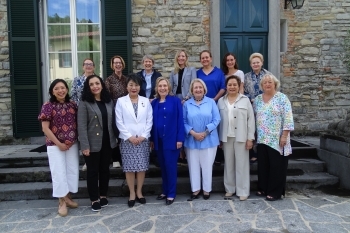Press Releases
Foreign Minister KAMIKAWA’s participation in the 2024 Global Women Leaders Summit

From June 24 to 26, Ms. KAMIKAWA Yoko, Minister for Foreign Affairs of Japan, participated in the 2024 Global Women Leaders Summit, at the Rockfeller Foundation’s Bellagio Center located near Milan, Italy. The overview of the conference is as follows.
- The Summit was hosted by the Rockefeller Foundation and the Georgetown University Institute for Women, Peace and Security, and chaired by the Honorable Hillary Clinton, Former Secretary of State of the United States of America and Ms. Melanne Verveer, the Executive Director of the Georgetown University Institute for WPS. At the invitation by the organizers, this summit was attended by Minister Kamikawa, H.E. Dr. Vjosa Osmani-Sadriu, President of the Republic of Kosovo, as well as current and former heads of state, ministers, researchers, and other women leaders to discuss women's participation and leadership in conflict situations, including WPS, in light of the current international situation and global challenges.
- Minister Kamikawa participated in the summit from the welcome event on the 24th through the morning session on the 26th. On the first day, discussions on climate change measures and the SDGs were held, and Minister Kamikawa was introduced by the organizers as a "global leader in WPS".
- On the 25th, Minister Kamikawa led the discussion at a session on advancing women's political leadership, and then spoke candidly about why she has a strong personal commitment to WPS. In addition, she pointed out the importance of support that incorporates women's needs and perspectives under the current international situation, which is becoming increasingly uncertain, based on her experience of visiting Ukraine, Palestine, and Africa and of seeing and hearing firsthand the difficulties faced by women there, ever since she was appointed Foreign Minister. Moreover, she received enthusiastic applause from all participants in the audience when she introduced Japan's efforts to vigorously promote WPS as one of its major foreign policies, based on the following three pillars: (1) the development of a system through the establishment of WPS Task Force, (2) the implementation of specific projects incorporating WPS perspectives, and (3) the strengthening of the collaborative networks with WPS as its axis. Furthermore, she actively contributed to the discussions in other sessions including those on women leadership and challenges, and challenges women leaders face on the frontlines of conflicts.
- On the 26th, at the session on standing with women leaders on the frontlines of conflict, Minister Kamikawa introduced Japan’s initiatives incorporating WPS perspectives, after hearing presentations on lessons learned from the real-life experiences of women who are playing leading roles for peace and stability on the frontlines of conflict in Ukraine, Afghanistan, Yemen and Sudan.
- With regard to Ukraine, in particular, Minister Kamikawa strongly condemned Russia’s aggression against Ukraine as an act that shakes the international order, and with the recognition that “Ukraine today may be East Asia tomorrow,” and stressed the need for assistance to Ukraine. In addition, focusing her thoughts on people leading their daily lives even under difficult circumstances, she introduced Japan’s initiatives such as the WPS session held during the "Japan-Ukraine Conference for Promotion of Economic Growth and Reconstruction” in February, as well as the "WPS HIMAWARI friends network" (HIMAWARI: Sunflower in Japanese) launched at that time. Moreover, regarding Sudan, she introduced the cooperation between Japan and IGAD (Inter-Governmental Authority on Development) and the discussion of her meeting with Dr. Workneh, Executive Secretary, and provided an overview of the Tokyo International Conference on African Development (TICAD) Ministerial Meeting, which Minister Kamikawa herself will chair in August this year.
- During this conference, all participants stayed in the same dormitory facility, sharing breakfast and dinner together, and held discussions throughout the day without companions or interpreters. Through these intensive discussions, they were able to build close relationships with women leaders and peacebuilding experts from each of the participating countries.
(Reference) Women, Peace and Security (WPS)
In 2000, for the first time in its history, the United Nations Security Council unanimously adopted "Women, Peace and Security (WPS) Resolution 1325," which clearly stated that international peace, conflict prevention, and conflict resolution require the equal participation of women, protection from sexual violence in conflict, and gender equality. To implement this and subsequent resolutions, Japan formulated the first national action plan in 2015, followed by the second one in 2019, and the third one in 2023.

